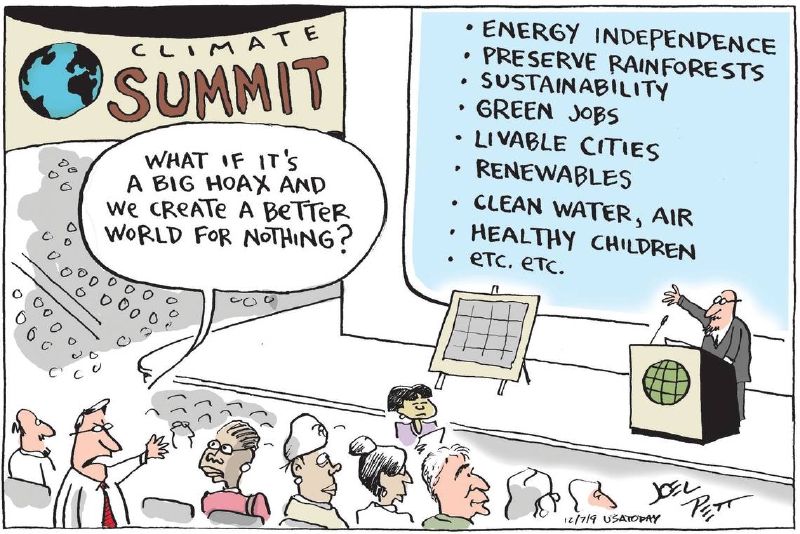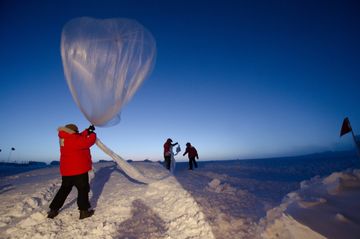Despite several years of warnings from scientists about the horrendous outcomes, climate deniers ignore the facts and science even as proof stares them right in the face.
The recent catastrophes in the United States, Germany, and China should be sufficient to end the lingering doubt that the planet is heating up, consequently wreaking havoc due to the continuous spew of greenhouse gases. Sadly though there are still plenty of people who deny that anthropogenic climate change exists.
A strategy on how to deal with climate deniers and bring them on board is imperative. Otherwise, global warming will assail humanity much sooner than envisaged. This fight calls for collective responsibility.
What do Different People Think of Climate Change?
The language and tone of climate change denial have transformed over time. Outright denial of scientific facts has been replaced to reframe climate change as a natural phenomenon; therefore, climate action is unwarranted.
However, this is just a different way of rejecting the facts and justifying inaction. To better understand this, let’s dig deeper into denialism.
Shades of Denial
The twin bundle of denial and inaction is correlated, at least in the context of climate change. Knowing that something is real and actively saying it’s not, is denialism.
Literal denial is the first form of denial. It is the simple outright rejection of an occurrence – simply put, climate change is a hoax. This is insidious and worrying in the face of immense scientific evidence of global warming. This could probably be attributed to individual malice or unwillingness to have to change their lifestyle.
The other form of denial is interpretive denial. In this case, people do not contest the facts; however, they interpret them in ways that distort the meaning and gravity. For instance, one might argue that climate change is not caused by humans but simply a natural fluctuation or a consequence of greenhouse gas accumulation. This is a damning level of ignorance. The more reason we need a blueprint of how to deal with climate deniers.
The third and niggling form is implicatory (or soft) denial . The facts of climate change are neither disputed nor misinterpreted as something else. Instead people downplay the severity and future impact, preferring inaction and keeping their lifestyle as it is. Failing to take responsibility despite acknowledging the science is real.
Of course, some inadequately respond due to financial limitations or otherwise, but implicative denial manifests as dissociation for many.
We are all just about guilty, to some extent, of partaking in implicatory denial. For instance, we use a reusable coffee cup, recycle plastic or occasionally catch a bus, and convince ourselves that we are doing our bit - and that’s more than what those around us are doing. But, in the real sense, we have not acted as we ought to according to the science of climate change.
Taking us back to the basics;
Who is a Climate Denier?
The definition of denialism varies. In psychology, it is to reject widely accepted assertions because the truth is psychologically discomforting. However in popular culture, including historical discussions and climate science, denialism is an active act of dissent against the consilience of experts, often propelled by ideological factors.
Literal climate deniers can fit into four main categories;
- The shills who are always paid by vested interests to ignite confusion about science or the economics of climate action.
- The grifters who thrive on contrarian articles for right-wing media outlets. They bask in the outrage, count the clicks and wait for payday. Do they even believe in the gibberish they write?
- The egomaniacs with stalled careers, fighting hog-wild to remain relevant in a world that has moved on from their ideologies. They would go to extreme lengths just to receive recognition.
- The ideological fools are the other types of climate deniers, possibly intelligent but short-sighted by their no-limits version of the free-market creed.
Wondering How to Deal with Climate Deniers?
Scientists have spent over three decades trying to provide as much information as possible, and, if anything, climate denial is only getting ingrained.
This denial is a choice. Investing energy and wasting time on the deniers will only slow us down, therefore the easiest choice is simply to ignore them all.
What about dealing with friends and family who are climate deniers?
The first step to addressing this elephant in the room is to talk about it.
Pushbacks and resistance are inevitable. This opposition is even more difficult to deal with when it involves the people close to you, which brings us to some tips and tricks that we can use to deal with uncomfortable family and friend discussions.
Introduce the Topic Casually
Break the ice by casually talking about global warming, perhaps on a totally different topic like the recent floods, current news, and the like. This will ease the transition into the bull’s eye — climate change.
After gauging the family member or friend’s interest, take advantage of the opportunity to ask questions to better understand their concerns and where they are coming from.
Listening to your close ones assures them that you respect them, regardless of your differences in opinions. And this leaves room for the possibility of change in the future, instead of making them feel judged and lectured.
Find Common Ground
Just the words “climate change” may be a trigger for arguments with some climate deniers — but for many, their belief systems are embedded in concern or misinformation.
Finding common ground helps you connect on a human level and better understand their concerns.
Then, in the conversation, institute climate change, connecting it to your shared experience. Bingo! They’ll probably listen to you with an open mind and maybe join the bandwagon.
Gear Yourself Up with Evidence - But Know when to Back Off
The antidote for misinformation about climate change is being informed. If you are up for a fight, especially with your dear ones, you need full armor because some live in a filter bubble where they only hear and sift opinions that reflect their belief system. Getting people to move past the talking points that they’ve replayed in their heads over and over again can be tough.
You can ask simple questions like what it would take to change their mind, and if the answer is “nothing,” then that’s a dead end.
But if they have specifics that they are looking for, then be ready to respond with fact-checked articles that refute misinformation politely. In the event of resistance and tension, back off and shift the conversation to something else to minimize the “backfire effect.”
Continued Conversation
This should not be looked at as a one-time conversation or argument but rather a continuous sensitization process and clarification of misconceptions about climate change.
Gradually make progress with the family members without necessarily pushing too hard. If all else fails, close up shop and assure them of your understanding and support.
Is There a Generational Gap when Dealing with Climate Change?
Interestingly, evidence in research shows a disparity in the age groups when it comes to the acceptance of scientific evidence. The younger generation is particularly concerned about global warming.
A 2018 Gallup analysis found a global warming age gap in some perceptions, beliefs, and attitudes. For instance, 70% of adults aged 18 to 34 are worried about global warming compared to 56% of those aged 55 or older.
Unfortunately, there has been little research on the subject matter, but it is tempting to speculate that perhaps the younger minds:
- Have been exposed more to the effects of global warming than their parents or grandparents.
- Are more open to new ideas, such as the possibility of humans altering something as complex as the earth’s climate, ushering in a new geological era.
- Are in an educational system that incorporates the concepts of the environment and climate, which was not the case decades ago.
Moreover, evidence points out clear differences in attitudes towards climate change due to education. The rise in global temperatures is not reflected in day-to-day weather experiences. It is likely that only those who have had formal education are more likely to know and understand it, either from learning directly at school or from active engagements with current affairs fostered by their education.
How are Different People Fighting Climate Change?
Across the life domain, everyone’s zones vary in size. Different people have taken on various challenges that have stretched them, leading to growth and learning. Below are different ways in which people manage climate change.
Comfort Zone
- They don’t care to understand the climate crisis.
- Not willing to change their lifestyles.
- View sustainability as binary.
- Denying their carbon privilege, living in Global North countries.
Fear Zone
- Place all the responsibility on corporations and none on their own actions.
- Post on environmental activities on social media without any tangible action.
- Shaming others for not being perfect environmentalists.
- Don’t question organizations involved in greenwash.
Learning Zone
- Do research before believing a brand’s marketing.
- Critically evaluate and cross-check information from different sources.
- Acknowledge those who’ve come before them in their sustainability journey.
- Practise self-awareness vs. criticizing others for their actions.
Growth Zone
- Empowered to play their role in society, starting with small adjustments at home.
- Collective responsibility in fighting climate change.
- Hold corporations accountable by boycotting any unethical practices.
- Not shaming others wherever they may be in the learning cycle.
- Commit to sustainability both on a professional and personal level.
- Practise gratitude for mother nature.
Why Do People Ignore Climate Change?
Climate deniers are one thing, but sometimes it is frustrating to deal with people who neither deny climate change nor lift a finger to understand it or fight against it. Some people have just become comfortable in their comfort zone, a perfect example of soft denial.
Implicatory (soft) denial is the most widespread shade of denial and it intersects factors such as cultural and emotional norms, economics, and geopolitics, which perpetuate the psychological barriers, motivating people to distance themselves from the reality of climate change.
For many people, thinking about climate change evokes a sequence of troubling emotions such as fear and guilt, resulting in detachment and keeping them from taking the necessary actions to address it.
Furthermore, governments and politicians collectively fuel climate change soft denial to ensure social cohesion and stability. Contemplation of a change in lifestyle to address climate change is perceived negatively by many people, manifesting into a failure to take action against climate change.
How Can We Help People to Move Away From Soft Climate Denial?
How to deal with climate deniers is largely embedded in collective accountability, starting from the government and political leaders. If the government is not acting, then why should an individual act? Breaking the cycle of inaction requires individuals to engage in democracy and demand commitment to climate action by governments.
Taking efforts to mitigate climate change at the community level through visible actions can break the cycle of denial from the ground up.
Additionally, we need to curb climate change denial due to lack of information by finding ways to educate and inform the public effectively.
Furthermore, greater acknowledgment of the underlying cultural and social factors that lead to denial will allow more practical solutions to denial and inaction.
Lastly, we must explore better ways of helping people move beyond a sense of guilt, helplessness, or fear and take actions necessary for collective long-term survival. People should talk freely about climate change and their emotions expressed to help them move past inaction.
Or is Persuading Climate Change Deniers a Waste of Time?
The fact is, facts don’t matter to climate deniers.
The current climate crisis is too urgent to wait for everybody to come on board. We should stop wasting time with people who deny the existence of climate change and drive action.
Attempting to convert deniers may not be the most productive way to fight climate change, but rather galvanizing those who are stuck in implicatory denial. We need mechanisms in place that can help them transition from the comfort zone through the growth zone.
We all need to improve individual actions, be patient, and continue sensitization in the hope that they come aboard one day. And that is how to deal with climate deniers.



